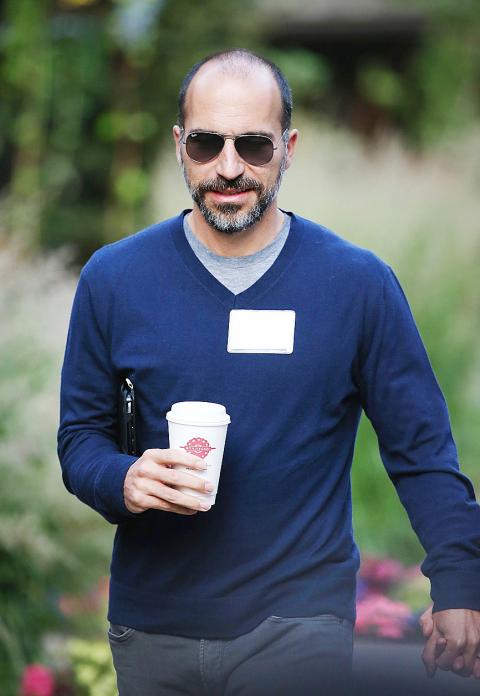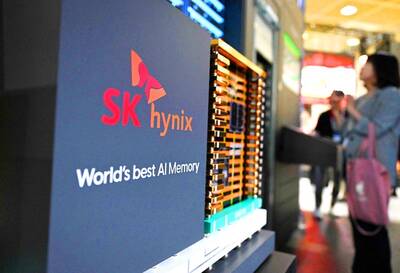Freshly hired Uber Technologies Inc chief executive officer Dara Khosrowshahi on Wednesday met with employees, promising to fight for the company and hinting that a stock market debut is in its future.
Khosrowshahi wore an Uber T-shirt as he was introduced to workers during an “all-hands” gathering at the San Francisco headquarters, according to photographs posted online.
Khosrowshahi tweeted a picture of his new Uber employee access badge and said that it functioned as promised.

Photo: AFP
While speaking with Uber workers, Khosrowshahi shared his opinion that the private company should go public, hinting that could happen in 18 to 36 months, according to the Wall Street Journal and other US media.
Uber on Tuesday announced that it hired Expedia Inc boss Khosrowshahi as its new chief executive, hoping that he can steer the ride-sharing service away from the string of controversies it has faced in the past year.
A possible stock market debut for Uber, the world’s most valuable private company based on funding rounds, has long been a source of speculation.
The Iranian-American has responded to initial public offering (IPO) questions by expressing the opinion that he would like to see it as late as possible.
Based on how much investors got for their money during recent funding rounds, Uber is valued at about US$68 billion.
Some mutual funds have reportedly marked down their stakes in Uber in a sign that months of scandal were taking a toll on the private company’s value.
Khosrowshahi faces many challenges, including conflicts with regulators and taxi operators, a cutthroat company culture and board members feuding with investors over former chief executive officer Travis Kalanick.
Kalanick stepped down as chief executive in June due to pressure from influential investors, including Benchmark Capital, which went on to file a civil lawsuit against Kalanick, accusing him of fraud, breach of contract and of plotting to manipulate the board of directors to allow him to return as chief executive officer.
Kalanick scored a victory on Wednesday when a judge granted his request to have the dispute handled in private arbitration instead of open court proceedings, according to US media reports.

Intel Corp chief executive officer Lip-Bu Tan (陳立武) is expected to meet with Taiwanese suppliers next month in conjunction with the opening of the Computex Taipei trade show, supply chain sources said on Monday. The visit, the first for Tan to Taiwan since assuming his new post last month, would be aimed at enhancing Intel’s ties with suppliers in Taiwan as he attempts to help turn around the struggling US chipmaker, the sources said. Tan is to hold a banquet to celebrate Intel’s 40-year presence in Taiwan before Computex opens on May 20 and invite dozens of Taiwanese suppliers to exchange views

Application-specific integrated circuit designer Faraday Technology Corp (智原) yesterday said that although revenue this quarter would decline 30 percent from last quarter, it retained its full-year forecast of revenue growth of 100 percent. The company attributed the quarterly drop to a slowdown in customers’ production of chips using Faraday’s advanced packaging technology. The company is still confident about its revenue growth this year, given its strong “design-win” — or the projects it won to help customers design their chips, Faraday president Steve Wang (王國雍) told an online earnings conference. “The design-win this year is better than we expected. We believe we will win

Power supply and electronic components maker Delta Electronics Inc (台達電) yesterday said it plans to ship its new 1 megawatt charging systems for electric trucks and buses in the first half of next year at the earliest. The new charging piles, which deliver up to 1 megawatt of charging power, are designed for heavy-duty electric vehicles, and support a maximum current of 1,500 amperes and output of 1,250 volts, Delta said in a news release. “If everything goes smoothly, we could begin shipping those new charging systems as early as in the first half of next year,” a company official said. The new

SK Hynix Inc warned of increased volatility in the second half of this year despite resilient demand for artificial intelligence (AI) memory chips from big tech providers, reflecting the uncertainty surrounding US tariffs. The company reported a better-than-projected 158 percent jump in March-quarter operating income, propelled in part by stockpiling ahead of US President Donald Trump’s tariffs. SK Hynix stuck with a forecast for a doubling in demand for the high-bandwidth memory (HBM) essential to Nvidia Corp’s AI accelerators, which in turn drive giant data centers built by the likes of Microsoft Corp and Amazon.com Inc. That SK Hynix is maintaining its